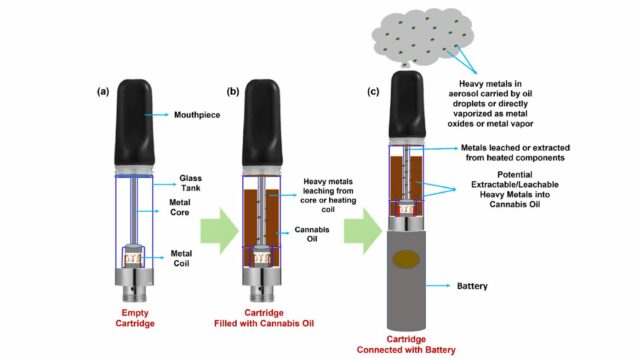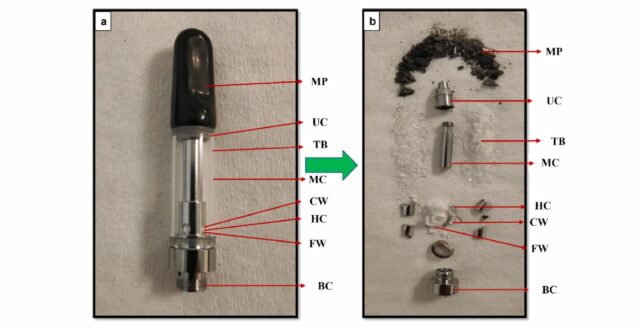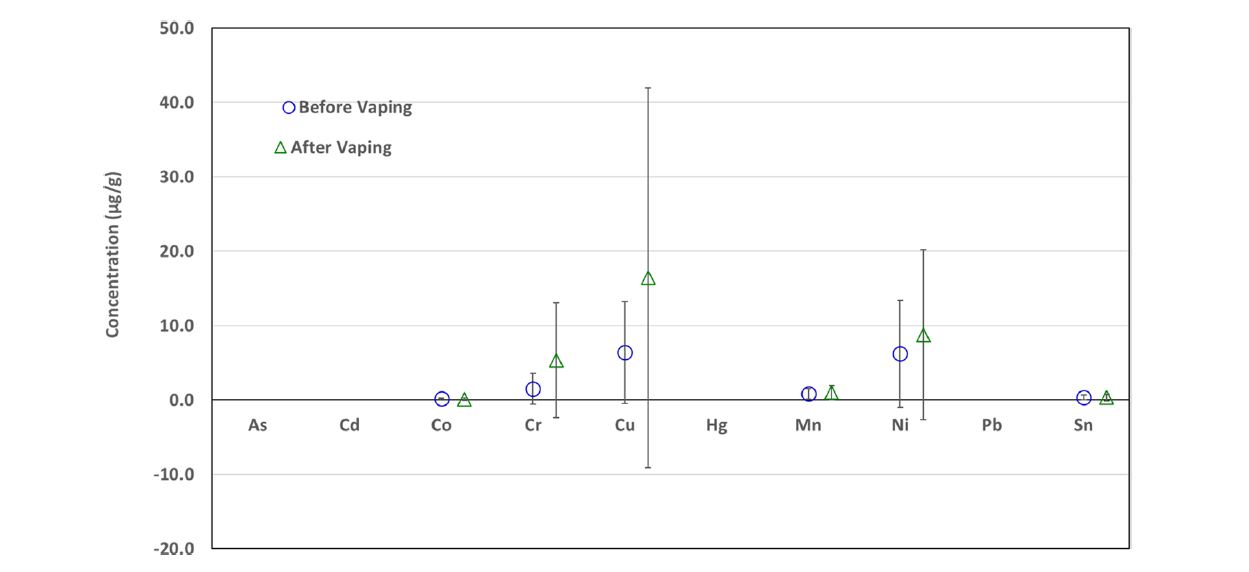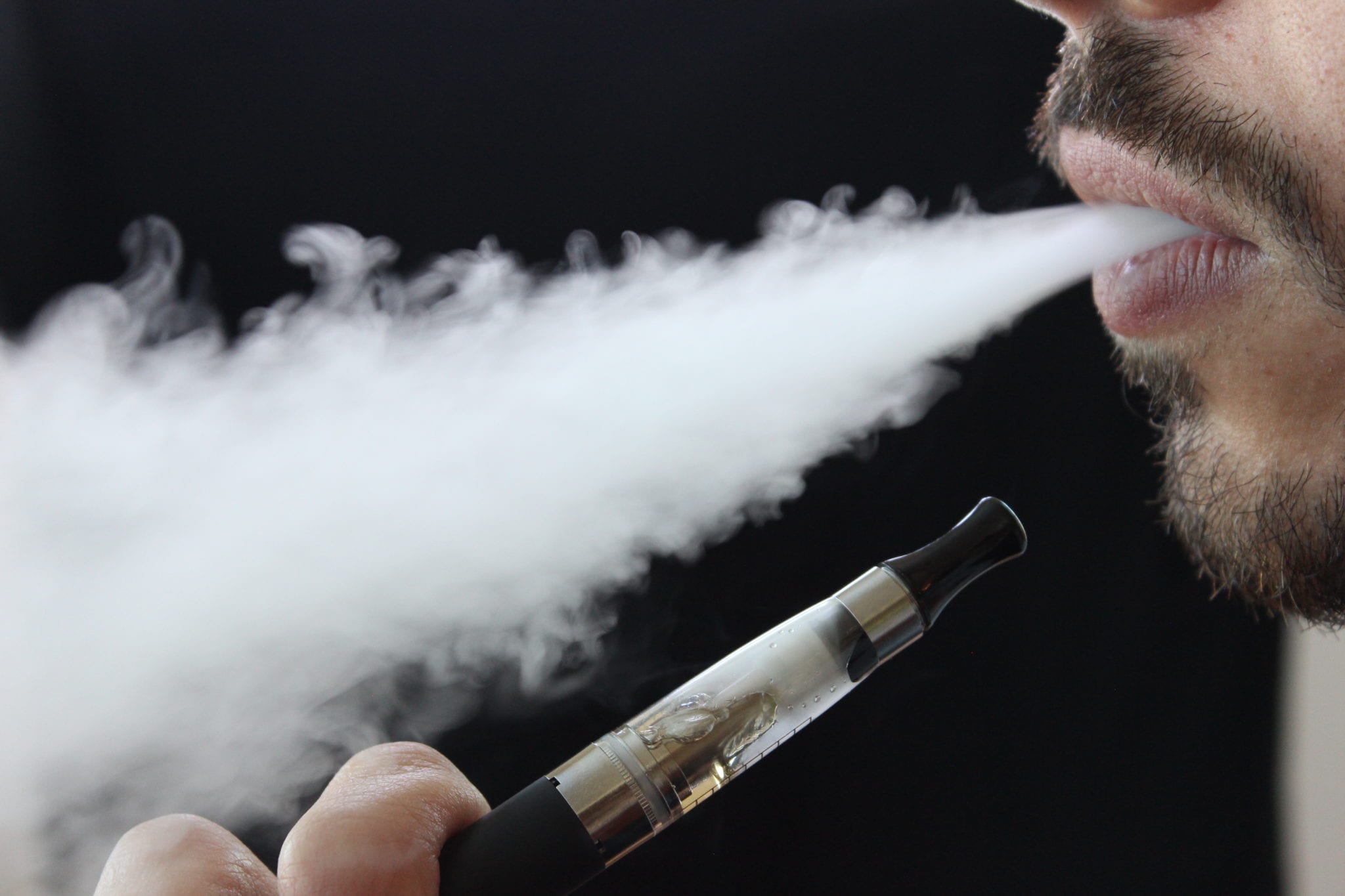People who consume cannabis via electronic devices may be inhaling neurotoxins and cancerogenic heavy metals that leach from the stainless steel cartridges into the oil.
That’s according to a recent study published in the journal Chemical Research in Toxicology, that found metals such as nickel, chromium and copper in the vaporized aerosols from regulated cannabis oil cartridges sold in Washington State.
It explains how vape cartridge heating coils and core parts are made of stainless steel, made of heavy metals, which can leach into the concentrate when heated or when the cartridge is left sitting for a long time.
“Once metals have leached into the concentrate, they could potentially be aerosolized and inhaled by the user,” reads the study by researchers at Medicine Creek Analytics, a testing lab.
Other studies have found that inhaling lead can cause neurotoxicity and cardiovascular disease. Research also shows chromium and nickel can cause respiratory disease.

Photo via ‘Metals in Cannabis Vaporizer Aerosols: Sources, Possible Mechanisms, and Exposure Profiles’
For the study, researchers analyzed 13 commercially available cartridges from different brands sold in Washington State, and tested levels of 10 metals in aerosol emissions including arsenic, cadmium, cobalt, chromium, copper, mercury, manganese, nickel, lead and tin.
To control for the effect of terpenes, seven- or 10-per-cent terpenated oils were compared with the 13 commercial oils.
“The metals found in the vapor of these cartridges can be directly correlated to the anatomy of the [device], sharing high contents of nickel, chromium and copper which are also found in ‘hot blank’ emissions without cannabis matrix being present in the cartridge,” reads the study.
Read more: Proposed flavour ban on weed vapes a ‘big win’ for black market
Read more: Health Canada wants to ban advertising of vapes to deter youth
The researchers found copper, nickel and manganese in all cartridges, but levels were lower in terpenated oils. Chromium was also detected in all cartridges except in the terpenated samples.
For further control, non-metal heating sources for vaping and combustion of products were compared. Additionally, the mechanisms behind ambient temperatures and several vaping cycles were explored to see what happens if cartridges aren’t used for months.

Cartridges are made of different types of metals and compounds that may be released into the oil after heat is applied
Number of puffs in a row, device temperature and oil acidity determine rate of leaching
According to the study, the rate of leaching can vary depending on time, temperature and oil acidity. Cannabis concentrates used for vaping oil are highly acidic, which increases the metal leaching rate. If left for months, the metals leach into the concentrate, even without heat and while under ambient storage conditions.
“Another factor that could lead to metals in the concentrate is the heat generated from initial puffs, which could accelerate the rate of cartridge metals leaching into the liquid, thereby creating an increasingly concentrated solution of metals in the latter part of the cartridge.”
If many subsequent puffs are taken in a short time, the coil might reach higher temperatures in later puffs if it doesn’t have sufficient time to cool.
Read more: US teens use more vapes, less drugs and alcohol: study
Read more: Threat of the vaping-related lung illness hasn’t passed, says Oregon doctor
Terpenes reduce metal content by cooling down devices or preventing leaching
Terpenated samples contained lower levels of metal than non-terpenated oils. Therefore, the difference in terpene content or the presence of other thinning agents could be a factor in metal leaching.
Cannabis distillate and concentrates are highly viscous and require thinning to flow in the cartridge, and a number of solvents are used for this, such as coconut oil, propylene glycol or unflavored terpenes.

Terpenes can temper the negative processes present in vaping, researchers say
When smaller-molecule terpenes are present, they become volatile more easily, which can lead to evaporation-induced cooling that reduces temperature locally at the heating coil.
The study tested other methods of consumption such as dabbing or combusting, and cannabis cartridges showed the highest levels of metals in the aerosol.
Read more: Vapes lead 2.0 market share in Canada, gummies set to rise: Headset
Read more: Could vitamin vapes be a thing?
The researchers say that while the cannabis industry and regulators have focused on vaporizer oils, there’s been a lack of testing on the aerosol mixtures produced by these devices.
Also, most states that require heavy metals testing for regulated oil cartridges only require analysis for arsenic, cadmium, mercury and lead. That means standard tests might not detect other elements that are leaching into the concentrate and then emitted as aerosols.
Researchers suggest further studies work toward developing regulations that account for the ten metals studied here, and investigate if all thinner concentrates have less metals in the aerosol or if it is terpene-specific.
Follow Natalia Buendia Calvillo on Twitter
natalia@mugglehead.com














